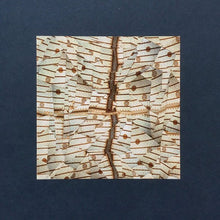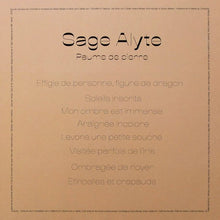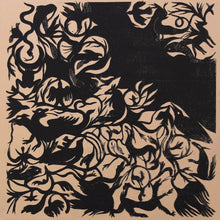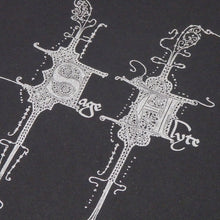Vlek / Belgium / 2021
Born in Brussels in 2018, Sage Alyte is the brainchild of Roxane Métayer (Disques du chevet, Morc, Krut) and David Jarrín Zabala (Disposición Asoleada, Lexi Disques). In its early days, the duo focused on live performances and the joy of intuitively composing and playing. Dressed in black, with the gravity of hypnotising snakes, they played fiery and enveloping melodies in local squats, cafés and small theatres. 'Paume de pierre', palm of stone in French, is a testimony of these spirited moments.
Seeking to materialise the fleeting and fascinating phenomena of nature, Sage Alyte has designed a grapevine of visions using a sober array of instruments (violin, banjo, gongs and bird calls) that evoke the scent of stone mortars milling cumin, pepper, cinnamon and herbs, or even those forest rocks that open like hands to dew, to dead leaves and branches that through their interlacing veins reflect starry skies, lights chasing the exact definition of dragonflies, water spiders, beetles, the muzzle of a horse, the shadow of an owl. All eight pieces of the album aim to create new ceremonies and rites and thus edge nearer to traditional music from the Andes or France.
Sage Alyte understands that daily life is filled with imperceptible ritual cycles of initiation, sowing, harvesting and metamorphosis that are expressed through dances whose steps are vaporous and minimal: in a sip of tea, the turn of a key, the tinkling of a gong. This is why each song is the result of a simple gesture like the rise of shadows, translucent spiders, toads and sparks that do not refer to a distant otherness, but to the lightness of everyday life when paying attention is enough to realize that everything dances, sings and waits for a renewed rite.
The stories running through Paume de Pierre bring it closer to an evasive tradition of the underground that can be recognised in the ethereal character of lightning and thunder, in the context of albums that take shape in the shade and are often remembered more by their ancient traces than by the echo of their steps. Such works are also manifestations of momentary conjunctions of artists making their different and singular approaches a fertile common ground, as in the case of ‘Trees, Chants and Hollers’ by Valerie Webb & Paul Labreque, or ‘At Swim Two Birds’ by Peter Jefferies & Jono Lonie, or, in a register closer to pop, ‘Flaming Tunes’ by Marie Currie and Gareth Williams. This debut album by Sage Alyte marks an interest in collaborations and sound worlds that draw their inspiration from clay and dust and spiral upwards to connect with the realms of the cosmic and epic.
Seeking to materialise the fleeting and fascinating phenomena of nature, Sage Alyte has designed a grapevine of visions using a sober array of instruments (violin, banjo, gongs and bird calls) that evoke the scent of stone mortars milling cumin, pepper, cinnamon and herbs, or even those forest rocks that open like hands to dew, to dead leaves and branches that through their interlacing veins reflect starry skies, lights chasing the exact definition of dragonflies, water spiders, beetles, the muzzle of a horse, the shadow of an owl. All eight pieces of the album aim to create new ceremonies and rites and thus edge nearer to traditional music from the Andes or France.
Sage Alyte understands that daily life is filled with imperceptible ritual cycles of initiation, sowing, harvesting and metamorphosis that are expressed through dances whose steps are vaporous and minimal: in a sip of tea, the turn of a key, the tinkling of a gong. This is why each song is the result of a simple gesture like the rise of shadows, translucent spiders, toads and sparks that do not refer to a distant otherness, but to the lightness of everyday life when paying attention is enough to realize that everything dances, sings and waits for a renewed rite.
The stories running through Paume de Pierre bring it closer to an evasive tradition of the underground that can be recognised in the ethereal character of lightning and thunder, in the context of albums that take shape in the shade and are often remembered more by their ancient traces than by the echo of their steps. Such works are also manifestations of momentary conjunctions of artists making their different and singular approaches a fertile common ground, as in the case of ‘Trees, Chants and Hollers’ by Valerie Webb & Paul Labreque, or ‘At Swim Two Birds’ by Peter Jefferies & Jono Lonie, or, in a register closer to pop, ‘Flaming Tunes’ by Marie Currie and Gareth Williams. This debut album by Sage Alyte marks an interest in collaborations and sound worlds that draw their inspiration from clay and dust and spiral upwards to connect with the realms of the cosmic and epic.








